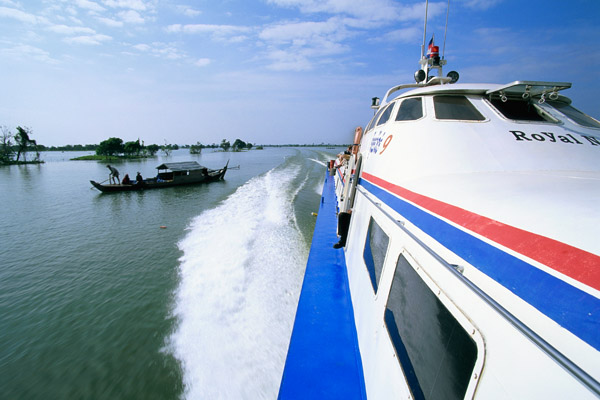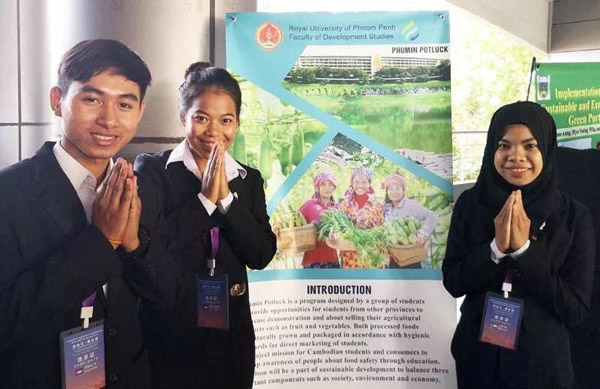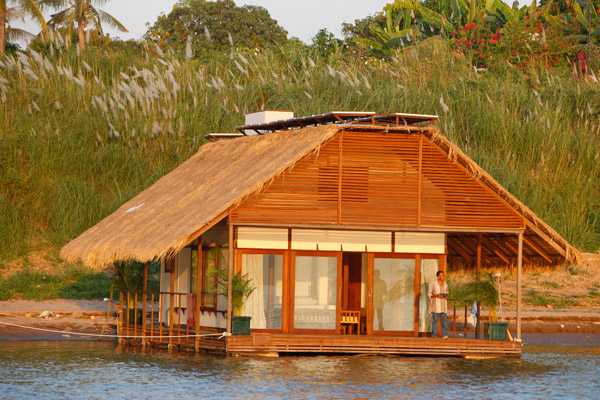 |
|
Local people and their families on and along the Mekong in Southeast Asia. PAUL A. SOUDERS/PASCAL DELOCHE/CORBIS |
A competition promotes the development of, and collaboration among, the countries in the Lancang-Mekong region, He Wei reports in Phnom Penh, Cambodia.
Used plastic bottles become building blocks. Banana stems are turned into handicrafts. And a social-credit system rewards environmentally friendly behavior.
These are some of the prototype solutions aimed at addressing environmental issues and empowering development in the Lancang-Mekong region.
The proposals, however, were not put forward by international development agencies. Instead, they are proposals put forward by university students from six countries along the river, who submitted research projects.
Welcome to the Youth Innovation Competition on the Lancang-Mekong Region's Governance and Development, which recently staged its fourth iteration since its debut in 2016. Attended by 60 students from China, Laos, Myanmar, Thailand, Cambodia and Vietnam, the four-day event from Jan 23 to 26 is designed to offer a chance to broaden the students' international vision and foster innovation and entrepreneurship.
"The competition marks a substantial implementation of the Belt and Road Initiative and brings in fresh forces to create a new model for global governance," said Jiao Yang, chancellor of Fudan University, a key organizer of the event, at the opening ceremony in Phnom Penh.
The event also came at a time when China-Cambodia relations received a boost after President Xi Jinping met with Cambodian Prime Minister Samdech Techo Hun Sen in Beijing in January and pledged to deepen cooperation in such realms as education and youth exchanges.
"When the likes of the United Nations established a set of targets for achieving sustainable development, one thing is for sure: The scale, scope and complexity of economic and social transformation require concerted efforts from various sectors, and that's when the power of the youth steps in," says Chen Zhimin, vice-president of Fudan University.
 |
|
Students take part in the recent Youth Innovation Competition on the Lancang-Mekong Region's Governance and Development in Phnom Penh, Cambodia. [Photo provided to China Daily] |
Based on stringent screening criteria, a total of 20 teams excelled and entered the final round of the competition, where finalists ran for four grand awards - Most Valuable Issue, Most Innovative Team, Best International Team and Best Project for Incubation - through group presentations, debates and ad hoc team tasks.
The Mekong River, known as the Lancang in China, is the world's ninth longest waterway. It's one of the most important water systems in Asia. It originates in, and runs through China, and also traverses Laos, Myanmar, Thailand, Cambodia and Vietnam before finally joining the South China Sea.
In the past few years, much attention has been attached to the joint protection, governance and development of this subregion, and to the economic cooperation and cultural exchange among the six countries.
Experts believe that building relationships across cultures is vital to creating a more peaceful and just world. When people from diverse cultures and backgrounds know and understand one another - and gain the skills they need to contribute as citizens and leaders - they form the global partnerships that underpin global security, economic stability and tolerance.
"It's a very important occasion for students to build competence, learn to work with each other and gain insights from experts," says Sethik Rath, dean of faculty of development studies at Royal University of Phnom Penh, who is on the expert committee guiding students through the preparations for their projects.
 |
|
Local people and their families on and along the Mekong in Southeast Asia. PAUL A. SOUDERS/PASCAL DELOCHE/CORBIS |
"These kinds of activities promote country-to-country relationships and cultural exchanges."
The work is normally inspired by their day-to-day lives. Bui Thi Minh Thuy, 22, from Vietnam, looked to make full use of the ubiquitous banana trees in her neighborhood and turn them into wrapping mate-rials and even artwork.
"The plants are primarily grown for the tropical look with their enormous leaves waving in the summer breezes, but their economic value is far from being fully tapped," says Thuy, a senior studying social sciences and the humanities at Vietnam National University.
Thuy and her peers set their sights on using the fibers from the banana stems to produce paper, bags and handicrafts. Their aim is to help foster sustainable agriculture as one way to mitigate climate change, diversify farmers' incomes and create new job opportunities.
However, the project failed to take into account the financial trade-offs that may occur, making it too idealistic to be implemented.
Zeng Qingjie, a political scientist at Fudan University, found a lack of business acumen and the reality checks to be common problems among the proposals.
"Some projects are simply too ambitious. Students didn't realize the necessity to turn ideas into viable business plans ... and have neglected such factors as the inclusion of various stakeholders, sources of funding and market acceptance," Zeng says, after coaching three students on a proposal to construct a new port in the Greater Mekong Subregion.
However, he and other professors still encouraged them to "think outside the box", staying true to the original purpose of the event.
"Of course, we don't want to see people come to us with existing business plans using traditional business models. A lot of the things people take for granted today all originated from aggressive and even crazy ideas. We just want to offer a quick reality check."
While only four out of the 20 projects won the final accolades, it was the cross-cultural communication that students deemed the most rewarding.
"It is kind of challenging to work with someone you don't know. You need to be friends first and then try and finish the project in time," says May Myat Noe, a first-year postgraduate student from Myanmar, who's studying environmental chemistry.
"Youngsters participating in this competition are likely to be among the future leaders of our respective countries. So, we must first learn to know each other thoroughly in order to unite in the future."
Fudan University's Jiao agrees and points out that the goals of the competition are to encourage innovative solutions regarding regional governance and to prepare the next generation to be able to meet challenges through concerted, cooperative efforts.
"Especially in the context of China's increasing links to the countries involved in the Belt and Road Initiative, the competition contributes to shared wisdom on inclusive development through question-oriented projects, serving as an avenue to promote people-to-people exchanges," she says.
Contact the writer at hewei@chinadaily.com.cn

Presented by Chinadaily.com.cn Registration Number: 10023870-7
Copyright © Ministry of Culture, P.R.China. All rights reserved